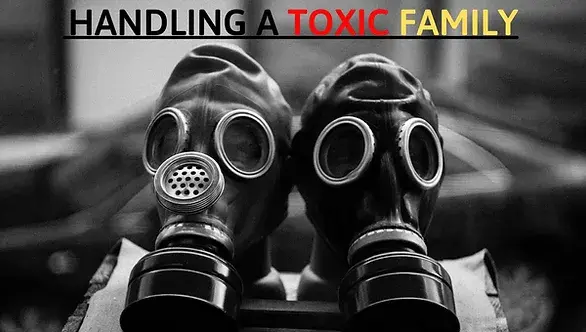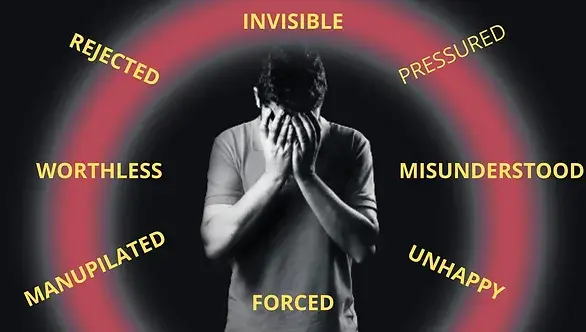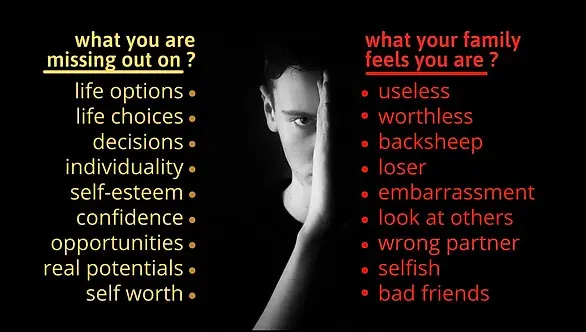Handling Toxic Parents
- Shetal Chavan

- Apr 10, 2023
- 8 min read

Parent (noun) : a father or a mother, an ancestor, precursor, or progenitor, a sourceand origin.
Family (noun) : a fundamental social group in society typically consisting of parents(father and mother) with their children.
Toxic (noun) : a chemical or other substance which is poisonous in nature.
For most of us home is where our parents and siblings reside though we find it betterwith a bunch of school friends, college friends, office colleagues or other friends fromthe building complex or vicinity where we are valued, heard and given respect. Weare the real 'us' with them around, we tend to smile, crack jokes, talk our hearts out,eat and drink as per our likings and there are no limitations or judgements ascompared to the atmosphere back home more over the way we are treated. If youfeel and do the same then you have TOXIC FAMILY
. Here are seven signs of having Toxic Family.
1. YOU FEEL INVISIBLE
By saying invisible I didn’t mean you may posses the watch from a Bollywood movieMr. India. It’s having your needs neglected by family. It is easy to feel invisible whenyour parents act as if they are too busy for you. No one seems to care or notice yourexistence, feelings, choices or your opinions.
2. YOU FEEL PRESSURED
Have you ever felt worthless? Your parents might be imposing conditions of worth onyou, which is a toxic behaviour. Parents may initially believe they are doing it for yourown good and build up setting unrealistically standards for you with constant criticismfor every perceived mistake. How much ever you try to give your best it will beinstantly put down.
A famous Psychotherapist, Carl Rogers says “The conditions of worth means thatyou only feel loved and accepted by someone when you live up to their expectationsof you."
3. YOU FEEL MISUNDERSTOOD & REJECTED
Probably you have tried talking to your family or shared your feeling or what you'regoing through yet, no member of the family seems to understand you or even care tounderstand. You feel dismissed and nothing is deemed important. Even though youseek help, they are not supportive on the contrary they remain unsympathetic andindifferent.

4. YOU FEEL YOUR WORTH DEPENDS ON WHAT YOU CAN GIVE AND NOT WHO YOU REALLY ARE.
Your family is only nice to you when they want you to do something for them? You even know that when they act caring they're gonna ask for some favour afterwards? Parents often manipulate and exploiting you for their own gain. They will consistently take without ever giving back. Even worse, giving in to their demands creates a positive feedback loop encouraging them to take advantage of you even more.
5. YOU FEEL FORCED TO BE AROUND THEM
You feel suffocated simply by being around them. You come home and spend time with them only because you have no other place to go. If you step up to make your own life easy, they will make you feel guilty, even ashamed for abandoning them and taking a different route in life. Painting you as the villain to everyone known to them and collecting their sympathies.
6. YOU ARE THE PAWN TO THE POWER POLITICS THEY PLAY
Power politics is defined as the struggle for power through dishonest and manipulative tactics. It creates a disruptive, chaotic and unstable nurturing environment. Parents tend to use their position in the family, their contribution in your life, counting out your mistakes for which they have covered up and make you do or act the way they would want you to.
7. YOU FEEL CONSTANTLY UNHAPPY BEING AROUND THEM
We do have our occasional bad days when being around anyone even the family is difficult. That's fine and is quite normal but the feeling being fairly constant being around them is a red flag. They drag you down into their overwhelming and persistent negativity. They are constantly complaining about the unfairness of life even when good things happen.
Living in a toxic family puts your mental health at constant risk. Moving away from your family does not necessarily reverse the damaging effects. There are side effects on your life as well. Below are some common side effects which develop during childhood and are evident as an adult.

1. YOU HAVE A FEAR OF BEING MANIPULATED.
Toxic family often involve some sort of daily manipulation between two or more family members. Manipulation is a serious form of mental and emotional abuse. Whether you have been directly manipulated or watched someone you love be a victim to it, this can cause you to grow fearful of this toxic behaviour. As a result, you may become avoidant of others in order to protect yourself.
2. YOU STRUGGLE WITH DEVELOPING YOUR SELF-IDENTITY.
Individuals from toxic families often struggle with image and low self-esteem issues because they were not brought up to have confidence in themselves. Parents who never respected your choices, opinions, decisions or simply boundaries. Consequently, you begin to see yourself in a negative light instead of having a family who helped you except your flaws, mistakes, and failures, you faced harsh criticism on a daily basis. Without a healthy sense of self-esteem, one can miss out of fulfilling their talents and potentials.
3. YOU HAVE DIFFICULTY TRUSTING OTHERS.
As children we first learn how to form relationships with others from our family. Toxic families often give children a reason to keep quiet, and they become distrustful of the world. When you learn to put walls out of fear of being vulnerable, it makes it hard for you to connect and relate with others. There is a constant thought and fear of being rejected and manipulated.
4. YOU HAVE TROUBLE INTERACTING SOCIALLY.
*Studies show that adults who were raised in toxic families showed struggles maintaining romantic relationships and overcoming their insecurities. As a result, many of them would deny reality and their own feelings. When you grow up in a household that exposes you to neglect, abuse, and mistreatment, the last thing you want to do is get close to people who might let you down or betray you. Moreover you yourself being judged by your family increases the chances of you friends or romantic interest being humiliated and rejected.
5. YOU HAVE ANXIETY OVERLOAD.
Children who grew up around toxic families are at risks of developing problems with their academics, social life and impulse control, because their brain is continuously exposed to cortisol, the Stress Hormone. It’s your natural “flight or fight” response which increases your heart rate and blood pressure. Systems of Generalised Anxiety Disorder include headaches, irritability, muscle tension, sweating constant worrying, and feelings of restlessness.
6. YOU DEAL WITH TRAUMA GOING THROUGH EMOTIONAL CUTOFF OR ESTRANGEMENT FROM YOUR PARENTS.
Once children in toxic families grow up into adults now financially able to support themselves, they often experience emotional cutoff or estrangement to disconnect from their unresolved family conflict. They have always been a part of the conflict and mostly they are the conflict themselves.
The PARENT-CHILD relationship can be complicated but what do you do when the parents who should nurture and support you is the source of your pain. A parent can be toxic to their child when the troublesome behaviour becomes so deeply ingrained that they do not realise the harm that they are causing. Toxic parent’s have a way of never assuming responsibility always putting all the blame on others and manipulating and they disguise it by saying I'm just trying to be a good parent when this happens even adult children are left terribly confused they want so much to believe that their mothers are loving and nurturing but what they get instead is an onslaught of accusations that leave them feeling devastated without being able to truly pinpoint why.
Let's look at what does and does not constitute toxic behaviour
Your family is not toxic simply because they discipline you or denies providing what you want or disagrees with you or has been interfering into your life and has rules they expect you to follow. However, if they do any of the following five things regularly it suggests their behaviour is toxic
1. They are negative and pay no attention to your feelings or needs.
2. They are emotionally unavailable
3. They use emotional blackmailing for controlling
4. Critical
5. Comparing you to others
6. Disrespectful of your boundaries
7. Manipulative
8. Playing the victim
9. Self-obsessed
10. Unapologetic
11. Blaming
12. Pushy and bossy
13. Obsessed with putting on a good front
This list is just a glimpse of the poor behaviours exhibited by toxic parents who disguise themselves as good.
HOW TO HANDLE A TOXIC FAMILY?
So what do you do when you want to love your family but their toxic behaviour is leaving you in desperate in need of a solution. Read on
1. Grieve the loss
but they are still alive you may think. Well that may be true but death is only one form of a loss. You need to grieve the loss of a loving relationship with your family as it will never change and add bringing further misery.
2. Forgive whether parents or siblings
know that their behaviour is toxic or not, forgiveness is not for them it's for you as it releases you from carrying that burden of religion teaching to respect elders and family members. So forgive but you don't need to automatically trust meaning you can forgive and have boundaries.
3. Talk to a therapist or friends
or any person who you feel comfortable about your sufferings and your families toxic behaviour. As it may have left you with deep emotional wounds it shouldn't define you or your identity.
4. Set realistic expectations when discussing about your toxic family. You will likely get healthier but this does not mean that your family will change overnight if there's been no repentance there will be no change

5. Set your limits and boundaries indicating where one person ends and the other begins. The fact that this woman or man is your mother or father or sibling respectively does not give them the right to overstep your boundaries.
Follow the below steps if setting boundaries is getting difficult set boundaries with the toxic parents
1. Recognise your family for the traits of toxic family.
Many broken daughters and sons remain in denial over their mothers or fathers and spend a lifetime struggling and in confused relationships. Just because someone holds a title in your life doesn't give them the right to treat you poorly.
2. Know the truth
Most of us have a confusion between taking care of the family and take their orders. If you don't want to do something or can't find a way to do it joyfully don't do it. In fact it's good to say NO sometimes. The yes you say every time simply enables your family to stay stuck in their poor behaviour.
3. Be realistic in expectation and thinking
Toxic families never appreciate a boundary so do not expect your parents or siblings to get in line and realise the error of their ways and you will have to tolerate inappropriate behaviour. Often worse than before as your family will likely try to re-establish their position of dominance. This may come through angry outbursts or manipulative tears or complete withdrawal. These tactics are meant to get you back to a place where they have control you. So, stand your ground if you're having trouble you may want to consider a form of distancing depending on the level of toxicity. You may consider not spending as much time or maybe even having a time of separation. Distancing does not imply that you don't love or honour your family but you need the time to learn how to establish new and healthier boundaries.
I want to encourage you to work on your toxic family. As they are very powerful and can do a lot to change your life. Every problem has a solution and this is possible only if one takes it as an option for self development. Our culture and history has always portrayed families as godliness and by mentioning toxic families I have no intention to disrespect or harm any sentiments. This is an issue that is ignored and an individual has to accept it and continue living a traumatic life. Identify and act is a key to exploring your true potentials.




Comments